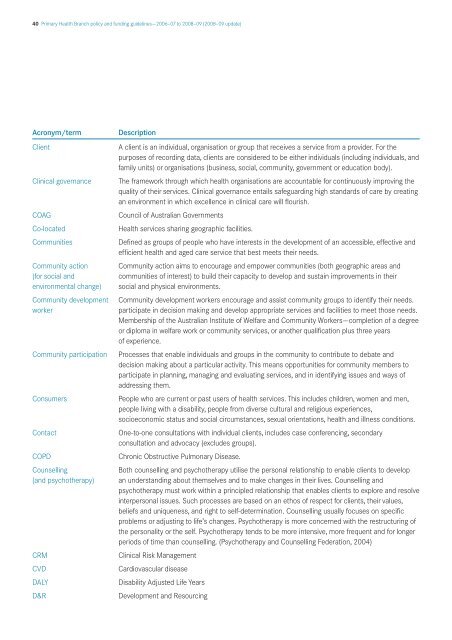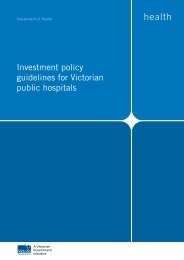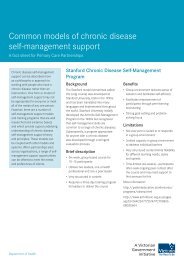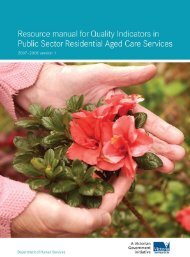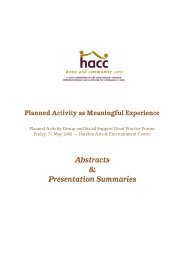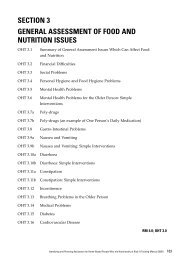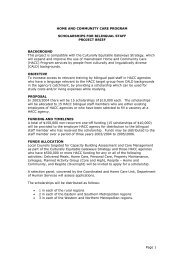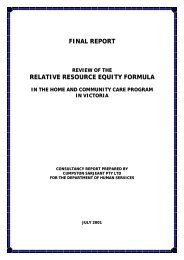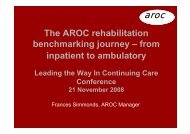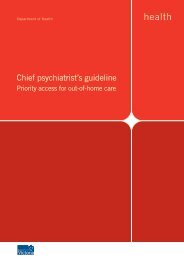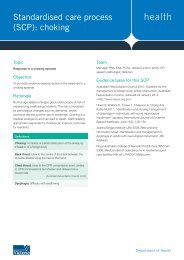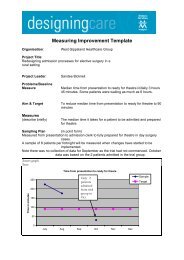Primary Health Branch policy and funding guidelines
Primary Health Branch policy and funding guidelines
Primary Health Branch policy and funding guidelines
You also want an ePaper? Increase the reach of your titles
YUMPU automatically turns print PDFs into web optimized ePapers that Google loves.
40 <strong>Primary</strong> <strong>Health</strong> <strong>Branch</strong> <strong>policy</strong> <strong>and</strong> <strong>funding</strong> <strong>guidelines</strong>––2006–07 to 2008–09 (2008–09 update)<br />
Acronym/term<br />
Client<br />
Clinical governance<br />
COAG<br />
Co-located<br />
Communities<br />
Community action<br />
(for social <strong>and</strong><br />
environmental change)<br />
Community development<br />
worker<br />
Community participation<br />
Consumers<br />
Contact<br />
COPD<br />
Counselling<br />
(<strong>and</strong> psychotherapy)<br />
CRM<br />
CVD<br />
DALY<br />
D&R<br />
Description<br />
A client is an individual, organisation or group that receives a service from a provider. For the<br />
purposes of recording data, clients are considered to be either individuals (including individuals, <strong>and</strong><br />
family units) or organisations (business, social, community, government or education body).<br />
The framework through which health organisations are accountable for continuously improving the<br />
quality of their services. Clinical governance entails safeguarding high st<strong>and</strong>ards of care by creating<br />
an environment in which excellence in clinical care will flourish.<br />
Council of Australian Governments<br />
<strong>Health</strong> services sharing geographic facilities.<br />
Defined as groups of people who have interests in the development of an accessible, effective <strong>and</strong><br />
efficient health <strong>and</strong> aged care service that best meets their needs.<br />
Community action aims to encourage <strong>and</strong> empower communities (both geographic areas <strong>and</strong><br />
communities of interest) to build their capacity to develop <strong>and</strong> sustain improvements in their<br />
social <strong>and</strong> physical environments.<br />
Community development workers encourage <strong>and</strong> assist community groups to identify their needs.<br />
participate in decision making <strong>and</strong> develop appropriate services <strong>and</strong> facilities to meet those needs.<br />
Membership of the Australian Institute of Welfare <strong>and</strong> Community Workers––completion of a degree<br />
or diploma in welfare work or community services, or another qualification plus three years<br />
of experience.<br />
Processes that enable individuals <strong>and</strong> groups in the community to contribute to debate <strong>and</strong><br />
decision making about a particular activity. This means opportunities for community members to<br />
participate in planning, managing <strong>and</strong> evaluating services, <strong>and</strong> in identifying issues <strong>and</strong> ways of<br />
addressing them.<br />
People who are current or past users of health services. This includes children, women <strong>and</strong> men,<br />
people living with a disability, people from diverse cultural <strong>and</strong> religious experiences,<br />
socioeconomic status <strong>and</strong> social circumstances, sexual orientations, health <strong>and</strong> illness conditions.<br />
One-to-one consultations with individual clients, includes case conferencing, secondary<br />
consultation <strong>and</strong> advocacy (excludes groups).<br />
Chronic Obstructive Pulmonary Disease.<br />
Both counselling <strong>and</strong> psychotherapy utilise the personal relationship to enable clients to develop<br />
an underst<strong>and</strong>ing about themselves <strong>and</strong> to make changes in their lives. Counselling <strong>and</strong><br />
psychotherapy must work within a principled relationship that enables clients to explore <strong>and</strong> resolve<br />
interpersonal issues. Such processes are based on an ethos of respect for clients, their values,<br />
beliefs <strong>and</strong> uniqueness, <strong>and</strong> right to self-determination. Counselling usually focuses on specific<br />
problems or adjusting to life’s changes. Psychotherapy is more concerned with the restructuring of<br />
the personality or the self. Psychotherapy tends to be more intensive, more frequent <strong>and</strong> for longer<br />
periods of time than counselling. (Psychotherapy <strong>and</strong> Counselling Federation, 2004)<br />
Clinical Risk Management<br />
Cardiovascular disease<br />
Disability Adjusted Life Years<br />
Development <strong>and</strong> Resourcing


